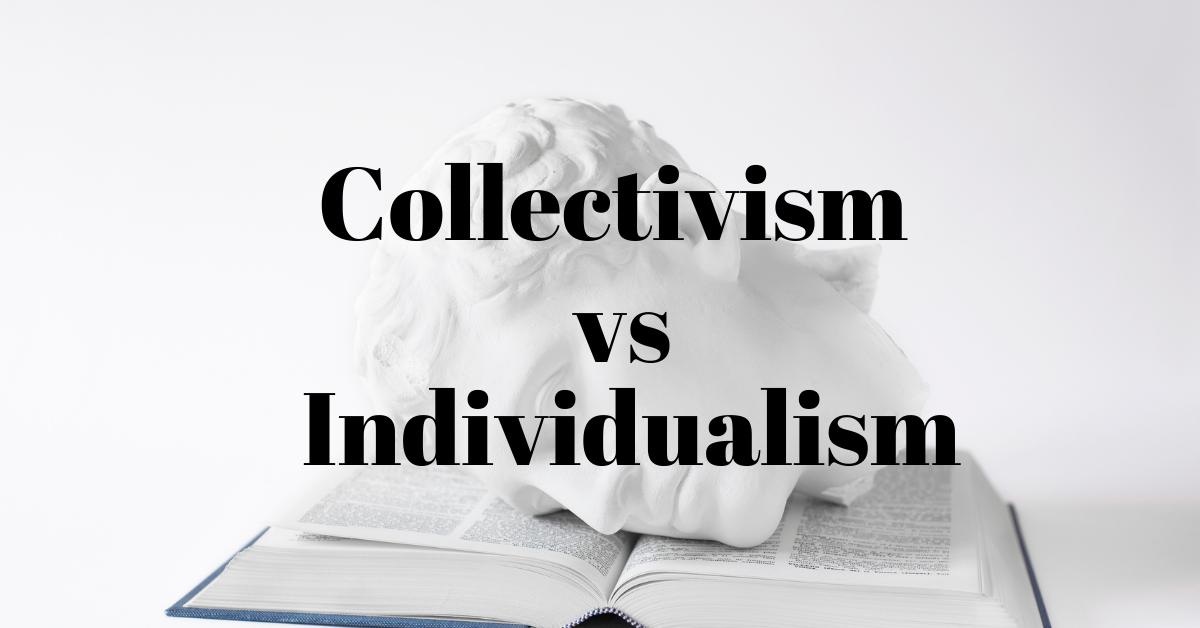Your cart is currently empty!
Oftentimes, we hear individualism or collectivism with a certain connotation of each word. Individualism is painted as narcissistic, self-centered and egotistical. Meanwhile, collectivism is revered as this end all be all solution to a functioning society that is altruistic. I find when discussing such topics, however, each term is not properly defined nor is it fully explained in pros or cons. I will first discuss briefly the origins then in the next post I will further evaluate individualism and collectivism critically.
Individualism is often associated with the western world, which makes sense as it was promoted by the western Church and the Renaissance. The most interesting thing about the creation of individualism is it naturally came about after the Church tried to make incest illegal (as before marrying your third cousin was quite common). The reason why we see family clans and feudal wars so often before this, is because the western world had a clear understanding of their family tree as everyone literally married in family. So, your sister’s husband was also your (typically third) cousin. When he was offended, your whole bloodline was offended. When this was no longer legal, however, people had to start paying more attention to their relationships with others and what they mean to others. They had to make a clear distinction of what exactly their identity was and how it fit into the grand scheme of things.
Meanwhile, the East, typically associated with collectivism, continued on with arranged marriages and a type of clan mentality. For instance, in Korea, most people come from the Park or Kim clan, thus meaning that somewhere along the line, they are related. Therefore, it was easier for the East to continue on the path of collective thinking as they continued on with this family mentality. It also helps that even today, Asia is extremely homogeneous and there is no real cultural disconnect on the individual level. So, it is easy to understand one another and it is also easy to see the grand scheme of things. This does come with some drawbacks, however, the most detrimental being suicide. Many factors play into why the suicide rates are so high in Eastern Asia: two of them being there is no real importance placed on human life compared to certain concepts, and not being able to save face/be an outcast. More often than not, schools in Eastern and South Eastern countries have extreme problems with bullying people who are outcasts, mostly dealing with status and appearances.
In the West, because of individualism and how important identity, we view life sacred, oftentimes because our religion told us so.
Now, let me back-up. What allows Eastern Asia: Japan, China, Korea, to see human life as something that is worth less than certain concepts? One of them has to be with the fact that there is no true recognized religion that is telling them that suicide is wrong. In the West, because of individualism and how important identity, we view life sacred, oftentimes because our religion told us so. God created humans in his image, therefore taking our life would be an insult to his image–or something along the lines of that. But, in Eastern Asia there really was no religion like that.
Furthermore, in many Asian languages there are strict hierarchies in place of how you call yourself and others according to status and verb conjugation. Essentially, because of the language set up, you are constantly being reminded of your position in the hierarchy and your status. For instance, you can forego the “I” in the sentence like saying, “went shopping” instead of “I went shopping,” in many of the languages home to such collectivistic societies. Even though this seems miniscule, it actually makes a detrimental difference from Western languages as the speaker is related context; whereas, in western languages the context is related to the speaker. So, from the get-go the language differences already set up from the eventual branching of division of collectivism and individualism.
Final thoughts
- Do you think one is inherently better than the other?
- Is collectivism just tribal thought with a bigger population?
- How important is honor to you and is it because of others or your own self-image?
If you have any questions or comments please feel free to comment below!
Until then,
Stay thinking!
Ocean
2 responses to “Collectivism vs Individualism”
-
I really enjoyed your post! 🙂
-
I loved this post 🙂 have a good day


Comment